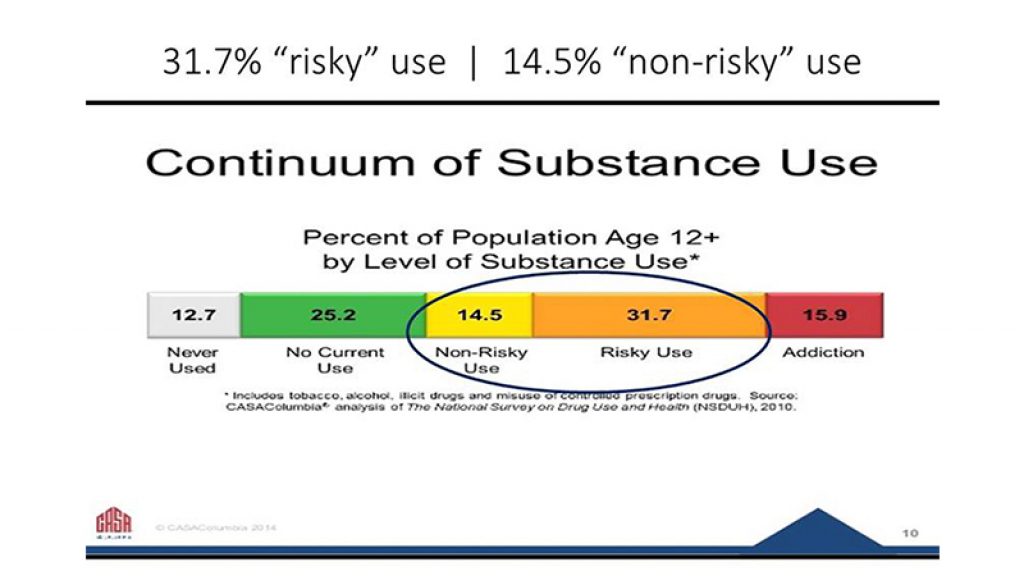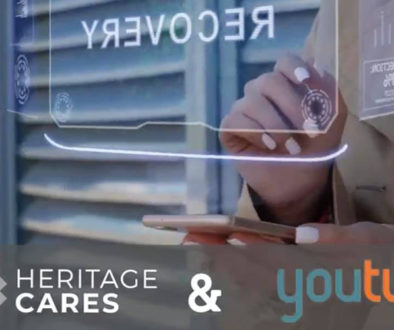Our Industry Has Failed At Engagement
The National Household Survey
From the CASA Columbia “Analysis of the National Household Survey on Drug Use and Health”.
Please take a moment and cogitate on the picture in this post.
Observe if you will the 2 “poles” of the continuum.
In theory we address the entire continuum of substance use; but does our practice/approach match the diversity and stages of substance misuse? Of course not.
In American society we approach substance misuse primarily in the following 2 ways:
- “Just Say No! Don’t Do Drugs” (focusing on the 12.7% “not using”). These are our prevention programs.
- “Wait Until You Hit Bottom”; admit you are an alcoholic or an addict and come to treatment (focusing on the 15.9% “addicted”).
This is our reality. Substance misuse is not discussed until IT HAS TO BE DISCUSSED. Until it cannot be ignored.
And even then we do a horrible job connecting to that 15.9%.
From the CASA Columbia Addiction Medicine Report:
While about seven out of 10 people with hypertension, major depression or diabetes get treatment for their medical conditions, only about one in 10 people with addiction involving alcohol or drugs other than nicotine do, leaving a treatment gap of 20.7 million individuals. The proportion of individuals in need of addiction treatment who actually receive it has changed little since 2002, when 9.8 percent of those in need received treatment.
Failed at Engagement
IT HASN’T CHANGED SINCE 2002. 16 YEARS.
I would say that indicates we have failed at engagement.
If we can start touching the people who are in the non-risky and risky categories we can make a difference.
But they are NOT going to come to your clinic.
They are not going to listen to the “Just Say No” presentation at school.
If they are in the risky category the “documentary on addiction” is not going impact them.
They are not going to go to a meeting and admit powerlessness.
Quite frankly, meetings are NOT designed for the “risky user”; they are designed for the “real alcoholic/addict”.
They are NOT going to come to an intensive outpatient program unless they have to, i.e. DUI, and then they are going to go through the motions.
This is What We Need
Information, non-judgmental information, that does not involve a diagnosis.
That does not involve a prescriptive “program”.
Does not require “admission” to a certain type of problem.
This is what we need. Engaging information. Professionally delivered.
With a nod toward healthcare rather than a nod toward rehab.
The word recovery may even be problematic for the “risky user” category. They just aren’t there yet.
Carpet Bomb with Information & Connection
If we carpet bomb the country with information and connection at a “stage appropriate” level, I believe that will lead to more people in the “addiction”‘ category seeking treatment.
If we “touch” people along the way as they progress toward addiction they will be more likely to seek help once they do cross that line. OR even before they cross that line.
The challenge is doing so at a “stage” appropriate level.
Engaging Content and Engaging People
We can’t talk to the public the same way we talk to one another.
This goes way beyond using the term “substance use disorder” versus the term “addiction”.
Avoiding the term “substance abuse” is not going to win the day in this regard.
Engaging content and engaging people talking about health and wellness will make more of an impact.
Almost Impossible
“Identification” is hard enough for a person who has crossed that line into “addiction”.
It will be almost impossible for the “risky user”.
Unfortunately many of these “risky users” are being sent to rehabs that were designed for the “addicted” person.
Causing more harm than good?
Embrace Harm Reduction
This is also going to require that professional providers embrace a harm reduction point of view.
NOT in terms of M.A.T. or needle exchange etc… but in terms of reduction in use; less dangerous use etc…
Increasing community tenure. Getting away from knee jerk referrals to inpatient rehab.
Many of you are cringing while reading this.
Noble and Important Work
I love everyone who works in this field. Y’all are doing noble and important work.
But the logic of my argument is beyond reproach. Don’t kill the messenger.
If we are ever going to slow the rampage of addiction we will need to implement these type of comprehensive interventions.
Emphasizing quality of life and health/wellness over “recovery”.




